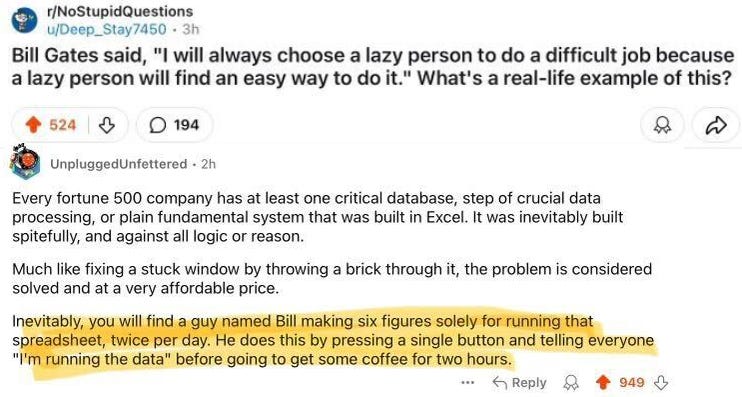Last Friday I came across the Reddit post below about the kinds of lucrative jobs “smart but lazy” people do.
I posted it on the Generalist World Slack and jokingly asked where I can find one of these jobs. It led to an interesting conversation about what business-culture environments produce this kind of work.
Shern Tee made a very astute observation:
You will find them in many institutions that engage large cohorts over predictable, medium-term, periodic journeys, and could use a database but lack funding for dedicated technical solutions. Educational institutions are the archetype; HR departments hold such jobs aplenty; I suspect political campaigns and similar apparatus are kept afloat by such people.
This led to a flashback of my first "real" programming job. In the mid nineties I picked up a temp job at a division of Price Waterhouse. The HR department needed someone to wrestle with a massive Quattro Pro spreadsheet someone had built for employee performance tracking and grading.
Even though I was still early in my career, I quickly realized that this was a terrible solution and suggested they convert to a Paradox database instead. They asked me to present a proposal, which I did, and it led to my first programming contract.
It's especially interesting because the PW division was called the Tax Technology Group, and they had a small army of Windows programmers building a hideously complex corporate tax compliance product. And yet, even in an environment full of talent, the HR department didn't have access to it and indeed couldn't even evaluate the skill set needed to solve their problem.
(Side note: at that moment I had zero experience with Paradox or really programming of any kind outside of a Pascal class I took in college. Nonetheless, that afternoon I walked to the bookstore and bought a book on Paradox, then started hacking on it at home. Eventually I got good enough to build what they needed and voila!)
When will AI solve for this?
In my career I’ve found that the best co-workers are:
Clear thinkers
Efficient communicators, and
Emotionally well-regulated
Those same qualities are present in “guy named Bill” in the Reddit post. He had decent tech skills but wasn’t a 10x programmer, he correctly assessed the best solution to the problem, and then he built an extremely efficient tool that solved a massive pain point.
In addition, Bill is easy to get along with and just cranks out the necessary report. Because he’s drama free, no one ever wonders whether he should be replaced. Sure, it might look hard from the outside, but he’s got it down to a system and lives a mostly stress-free life.
These qualities also show up in email communications. For the last few years I’ve been of the opinion that you can tell a lot about how a person thinks and works just by reading their email and Slack messages.
Do they succinctly give you the information you need, or do they ramble on in a wall of text?
Do they answer the question you asked, or do they not read your message closely and make assumptions about what they think you need and answer that instead?
Do they take bad news well, or do they freak out and pick a fight with the messenger?
Like personality tests do with abstract hypotheticals, I suspect there’s some method by which a candidate could grant an AI access their communications, and the AI could make a qualitative assessment based on real world information.
Of course, many jobs have very specific requirements — detailed knowledge of how to structure a Kubernetes cluster, or experience managing a complicated civil engineering project — but even with those roles, after the technical assessment is done you still want to know how the candidate communicates and deals with setbacks. Not what they say they will do in an interview, but how they actually behave.
I’m not motivated to build this on my own, but I’d love to work on a project like this. I’ll even forgo the “lazy” part while we do it. 😜


